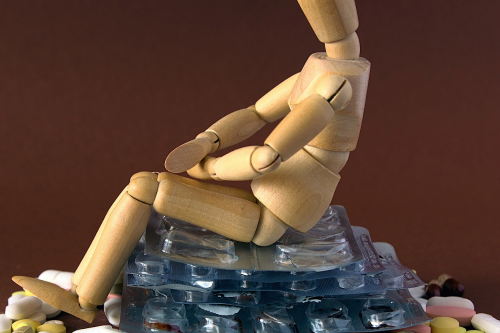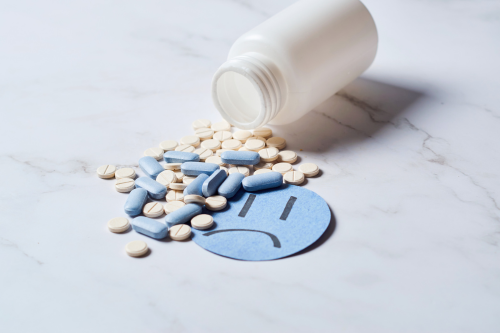

Depressants are drugs that slow down activity in the central nervous system. If you’re wondering what do depressants do, they reduce brain stimulation, often producing calming effects. These substances are commonly used for anxiety, insomnia, pain, and seizures, but they also carry serious risks like addiction, overdose, and physical dependence.
Depressants act directly on the central nervous system by increasing activity at the GABA neurotransmitter. GABA slows brain activity, which reduces arousal and leads to sedation. This is why depressants are often prescribed as sedatives, anxiolytics, or hypnotics.
At Sullivan Recovery in Mission Viejo, we often treat individuals whose substance abuse began with a prescription depressant like diazepam or lorazepam. Many experience rebound effects and drug withdrawal once their dose is reduced.
Prolonged use can impair nervous system function and raise the risk of physical dependence and addiction. Depressants also interfere with pain regulation and emotional stability, complicating recovery for those with co-occurring disorders.
The most common depressants include benzodiazepine medications like alprazolam, nonbenzodiazepine sleep aids like zolpidem, and barbiturates such as phenobarbital and pentobarbital. Other substances like alcohol, codeine, and methaqualone also have depressant effects.
These drugs are used to manage insomnia, seizures, anxiety, and muscle spasms. However, the side effects can lead to severe issues like addiction, suicidal ideation, and overdose—conditions we address every day at our outpatient treatment center.
We also see cases where these depressants are used recreationally, leading to chronic substance abuse and damage to the central nervous system. Barbiturate and benzodiazepine misuse often results in severe drug withdrawal and long-term sedative dependency.

Depressants are prescribed to help patients cope with anxiety, panic attacks, insomnia, and some forms of pain. For example, alprazolam is often used for short-term anxiety relief, while eszopiclone treats chronic sleep issues.
Physicians must carefully manage each patient’s dose to avoid risks like dizziness, nausea, amnesia, and somnolence. At Sullivan Recovery, we see many clients whose original prescriptions led to dependency and the need for therapy or detox support.
Side effects from depressant use can include fatigue, confusion, weakness, memory loss, and even unconsciousness. More serious reactions include respiratory depression, hypoventilation, blood pressure changes, and heart rate irregularities.
Depressants also interact with the brain’s serotonin and dopamine pathways, which can affect emotion, perception, and behavior. When misused, the risk of overdose and death increases, especially when combined with alcohol or other drugs.
Chronic use of depressants can lead to substance abuse and physical dependence. People often develop tolerance, requiring higher doses to feel the same level of sedation or relaxation.
Withdrawal symptoms can be dangerous, including seizures, psychomotor agitation, vomiting, and panic attacks. Our outpatient program at Sullivan Recovery provides medication-assisted treatment to safely manage depressant withdrawal and avoid relapse.
As the brain adjusts to constant GABA stimulation, it reduces natural GABA production and increases excitatory responses. This shift affects neurotransmitter balance, making the person more anxious, irritable, and emotionally unstable without the drug.
This neurological shift explains why stopping depressants abruptly can trigger severe withdrawal, including seizures, suicidal ideation, and rebound insomnia. Our experienced clinicians at Sullivan Recovery create tapering plans to help ease the process.

Depressant users often have co-occurring conditions like depression, bipolar disorder, or restless legs syndrome. In many cases, these issues fuel reliance on drugs like triazolam, zolpidem, or doxylamine to manage symptoms.
Our dual diagnosis treatment addresses both mental health disorders and substance use. Whether it’s anxiety, stress, or sleep disruption, we develop therapy plans that reduce the need for medication over time.
Unmanaged depression and insomnia can drive sedative use, increasing the likelihood of substance abuse and addiction. Our clinicians help patients safely taper off depressants and manage drug withdrawal while addressing nervous system health.
Ethanol, the active ingredient in alcoholic drinks like beer and wine, is a central nervous system depressant. Alcohol intoxication lowers blood pressure, slows breathing, and impairs motor function and orientation.
Many of our clients began with casual drinking but progressed into alcohol dependence or opioid overdose risk when combining depressants. We support these patients with evidence-based therapy and medication management.
Alcohol’s effects on the nervous system closely mirror those of benzodiazepine and barbiturate drugs. Prolonged use increases the risk of addiction, especially when used to self-medicate for pain or emotional distress.
Mixing multiple depressants—such as combining a benzodiazepine with alcohol or opioids—increases the risk of hypoxia, coma, and death. These interactions overwhelm the respiratory system and central nervous system.
At Sullivan Recovery, we routinely educate patients on the risks of combining depressants. We emphasize how even medications approved by the Food and Drug Administration, like hydrocodone or clonazepam, can be deadly when misused.
This type of polydrug substance abuse often leads to rapid physical dependence and severe drug withdrawal. Many of our clients enter treatment after experiencing overdose scares or developing tolerance to sedative effects.
Drug withdrawal from depressants may involve tachycardia, nausea, headache, aggression, diarrhea, palpitations, or dizziness. Emotional symptoms can include fear, depression, and suicidal thoughts.
We provide close monitoring during detox and continue support through outpatient therapy. Our treatment center in Orange County offers safe coping strategies that reduce stress without relying on depressants.
Drug withdrawal can also involve pain sensitivity and nervous system overstimulation, especially after long-term barbiturate or benzodiazepine use. Our goal is to minimize relapse risk and support long-term recovery from addiction.

Depressants bind to GABA-A receptors, increasing chloride ion flow and causing hyperpolarization of neurons. This action decreases excitability, leading to sedative and muscle relaxant effects.
Drugs like diazepam, flunitrazepam, and zaleplon target GABA receptors. However, repeated use can change receptor sensitivity, causing both physical dependence and tolerance—major factors we address in outpatient recovery.
As receptor changes progress, the nervous system becomes less responsive to normal GABA function, deepening the cycle of addiction. This is especially common in individuals with long-term benzodiazepine or barbiturate exposure.
Unlike stimulant drugs like amphetamine or Adderall, depressants lower nervous system activity. They reduce arousal, blood pressure, and alertness, while stimulants increase energy and heart rate.
Understanding this difference is vital in treatment. Some patients misuse both types of drugs, switching between them to balance effects—a cycle we work to break through therapy and relapse prevention.
Nonbenzodiazepines such as zolpidem, eszopiclone, and zaleplon are used to treat sleep problems without the same chemical structure as benzodiazepines. Despite that, they still affect the same GABA-A receptor.
These drugs can cause memory impairment, next-day fatigue, and even sleepwalking. Patients at Sullivan Recovery often seek help after experiencing side effects like disorientation and euphoria that led to misuse.
Long-term use can result in physical dependence, similar to traditional benzodiazepine medications. These sedative-hypnotics can also worsen substance abuse patterns and increase the risk of addiction when used improperly.
Stopping depressants suddenly can lead to rebound insomnia, anxiety, or seizures. These symptoms are especially common with short-acting drugs like triazolam and secobarbital.
We manage rebound effects by gradually reducing the dose and supporting patients through behavioral therapy. Our approach helps prevent physical stress on the brain and nervous system.
Rebound symptoms often emerge due to nervous system overactivity and disrupted GABA signaling. At Sullivan Recovery, we treat clients dealing with both drug withdrawal and sedative addiction caused by long-term use.

Overdose signs include shallow breathing, unconsciousness, slow heart rate, and cold skin. A patient may also experience blood oxygen drops, pressure loss, and confusion.
We frequently see opioid overdose cases that involve depressants like methadone, codeine, or hydrocodone. Our medical detox process is designed to stabilize these patients safely.
Benzodiazepine and barbiturate overdose can be fatal when combined with other sedatives or alcohol. These central nervous system depressants suppress vital functions, increasing the risk of death from substance abuse and toxicity.
When used as prescribed, depressants can offer real relief from anxiety, insomnia, and pain. However, misuse leads to changes in brain chemistry, behavior, and long-term health.
Recreational users may chase feelings of relaxation, euphoria, or amnesia. Over time, these effects lead to disease, emotional dysfunction, and a need for structured recovery at a licensed treatment center like Sullivan Recovery.
Continued recreational use often results in drug withdrawal, physical dependence, and full-blown addiction. We help patients transition from sedative misuse to safer, supervised therapy that supports nervous system healing.
If you or a loved one is struggling with depressant misuse, therapy and structured outpatient treatment can help. Our team specializes in treating physical dependence, withdrawal, and co-occurring disorders.
From GABA receptor education to tapering schedules, Sullivan Recovery provides every patient with a personalized treatment plan. We help people regain control without relying on medications that impair the brain and nervous system.
Final Thoughts
Understanding what do depressants do is essential for anyone using medications like benzodiazepines or barbiturates. These substances affect the central nervous system, slow brain activity, and can lead to serious side effects when misused. At Sullivan Recovery, we help patients overcome addiction, manage drug withdrawal, and reduce relapse risk through outpatient care that supports long-term healing.
Let us help you take the next step toward recovery.
At Sullivan Recovery, as an in-network provider we work with most insurance plans, such as:
And More
If you or a loved one are struggling with mental health challenges or substance abuse, reach out to Sullivan Recovery today. Our team of compassionate professionals is here to support your journey towards lasting well-being. Give us a call at 949-836-7180.
Yes, certain over-the-counter medications, especially antihistamines like doxylamine and diphenhydramine, can have depressant effects on the central nervous system. While not as potent as prescription sedatives, they can still cause drowsiness, slowed reaction time, and fatigue. Misusing these medications in high doses may increase the risk of addiction, especially when combined with other substances.
The duration depends on the specific drug, its half-life, dose, and your metabolism. Short-acting benzodiazepines like triazolam may leave the body within hours, while long-acting depressants like diazepam or phenobarbital can linger in the system for days. Traces may still be detected during drug testing even after effects have worn off.
Yes, some natural substances like valerian root, melatonin, and L-theanine have mild sedative effects and may support relaxation or sleep. However, these do not affect the central nervous system as powerfully as prescription depressants and are not suitable for severe anxiety or insomnia. It’s important to consult a physician before substituting or combining any treatments.
Yes, in some individuals, depressants may worsen symptoms of depression, bipolar disorder, or PTSD. They can dull emotional response and lead to increased fatigue or suicidal ideation. This is why dual diagnosis treatment is essential for those with both a substance use disorder and a co-occurring mental health condition.